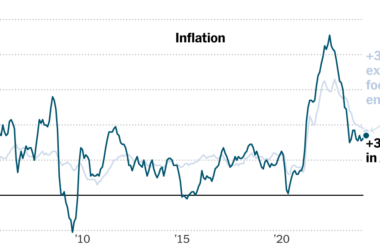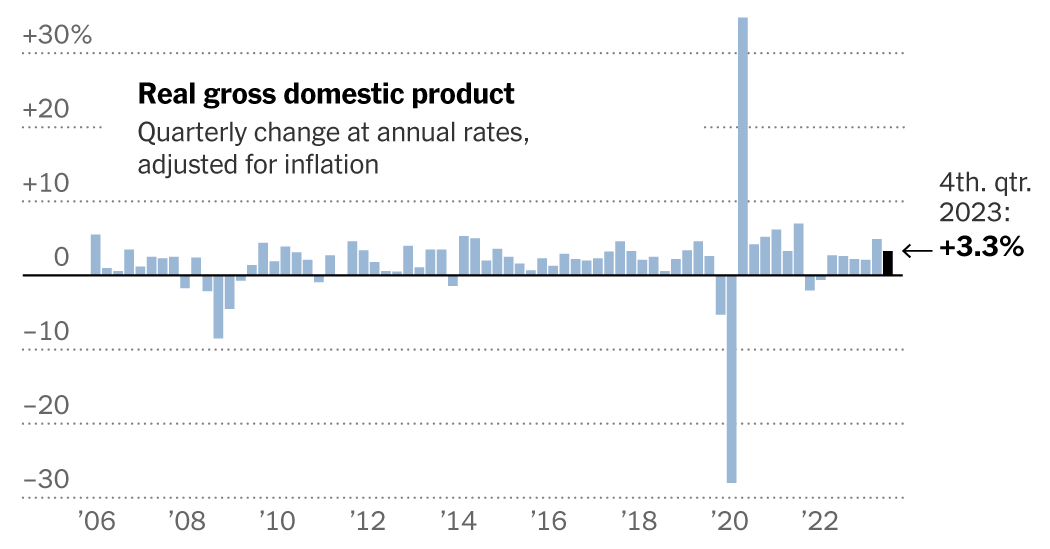The U.S. financial system continued to develop at a wholesome tempo on the finish of 2023, capping a 12 months during which unemployment remained low, inflation cooled and a broadly predicted recession by no means materialized.
Gross home product, adjusted for inflation, grew at a 3.3 percent annual rate within the fourth quarter, the Commerce Division stated on Thursday. That was down from the 4.9 % fee within the third quarter however simply topped forecasters’ expectations and confirmed the resilience of the restoration from the pandemic’s financial upheaval.
The newest studying is preliminary and could also be revised within the months forward.
Forecasters entered 2023 anticipating the Federal Reserve’s aggressive marketing campaign of interest-rate will increase to push the financial system into reverse. As a substitute, progress accelerated: For the complete 12 months, measured from the tip of 2022 to the tip of 2023, G.D.P. grew 3.1 %, up from lower than 1 % the 12 months earlier than and quicker than the common for the 5 years previous the pandemic. (A unique measure, based mostly on common output over the complete 12 months, confirmed annual progress of two.5 % in 2023.)
“Gorgeous and spectacular,” Diane Swonk, chief economist at KPMG, stated of the newest knowledge. “We’ll take the win.”
There may be little signal {that a} recession is imminent this 12 months, both. Early forecasts level to continued — albeit slower — progress within the first three months of 2024. Layoffs stay low, and job progress has held regular. Cooling inflation has meant that wages are once more rising quicker than costs. And client sentiment is finally exhibiting indicators of rebounding after years within the doldrums.
“It’s laborious to think about how issues may look higher for the delicate touchdown,” stated Brian Rose, senior economist at UBS. “Trying again finally 12 months, the mix of progress and inflation that we had was not thought of within the realm of chance by most individuals. To have such robust progress, low unemployment and to have inflation coming down that rapidly, even the optimists weren’t that optimistic.”
The fourth-quarter knowledge offered extra proof that the restoration stays on stable footing. Client spending, the bedrock of the U.S. financial system, grew at a 2.8 % annual fee, solely modestly slower than the prior quarter. The housing sector, which was battered by excessive rates of interest in 2022 and early 2023, grew modestly for the second quarter in a row. Companies stepped up their funding on tools. Private revenue rose quicker than costs because the robust job market continued to learn employees.
Maybe most importantly, inflation continued to chill: Client costs rose at a 1.7 % annual fee within the closing three months of the 12 months, beneath the Fed’s long-run goal of two %. (Measured from a 12 months earlier, costs have been up 2.7 %.) That isn’t simply excellent news for households bruised by two years of quickly rising costs; it additionally makes a recession much less doubtless, as a result of it offers Fed policymakers extra flexibility to chop rates of interest to maintain the restoration on monitor.
“Even when we see some indicators of recessionary forces, the Fed may be capable of reply pretty rapidly,” stated Aichi Amemiya, senior economist at Nomura.
President Biden cheered the newest knowledge on Thursday as proof that his financial insurance policies have been working.
“Wages, wealth and employment are increased now than they have been earlier than the pandemic,” he stated in an announcement. “That’s excellent news for American households and American employees.”
Dangers stay. Separate knowledge on Thursday confirmed that new filings for unemployment benefits rose final week. Shoppers have more and more funded their spending with bank cards and different types of borrowing, corresponding to “purchase now, pay later” loans, which may show unsustainable, particularly if the job market weakens. Excessive rates of interest proceed to ripple by way of the financial system, and developments abroad — from battle within the Center East to financial weak point in China — may have home penalties.
Such threats don’t appear to be fazing traders, who’ve pushed the inventory market to report highs. And companies, too, seem like rising extra assured, stepping up their funding after a 12 months spent girding for a attainable downturn.
“I believe the fears that the financial system was going to slide right into a recession are just about behind us, and it looks as if companies are planning for progress,” stated Ben Herzon, an economist at S&P International Market Intelligence.
Mike Stasko Jr. went into final 12 months anticipating it to be a troublesome one for Sunny Avenue Cafe, the chain of breakfast eating places the place he’s head of name technique.
“This time final 12 months, there was some hand-wringing happening,” he stated. The Ohio firm, which owns 10 places and has one other dozen owned by franchisees, determined to defer enlargement plans to see how excessive rates of interest and a attainable recession would have an effect on its enterprise.
Inside just a few months, nevertheless, it turned clear that Sunny Avenue was persevering with to thrive. Enterprise wasn’t rising as quickly as within the frenetic days after pandemic lockdowns lifted, however clients have been nonetheless consuming out, and the marginally cooler labor market made it simpler to rent. It didn’t damage that the surge in egg costs in late 2022 and early 2023 pale because the 12 months went on. By the center of the 12 months, the corporate was again in enlargement mode.
“We simply form of had that good, regular, predictable progress over the course of the 12 months, which is strictly what you need,” Mr. Stasko stated. “From our perspective, it was an awesome 12 months.”
For a lot of companies, the frenetic tempo of the early reopening interval has been changed by one thing that feels extra sustainable. Employees aren’t altering jobs as usually, giving them time to get higher on the jobs they’ve. Applied sciences and business-model adjustments adopted within the pandemic have turn out to be extra acquainted. Demand has turn out to be extra predictable. All of that led to improved productiveness, permitting for quicker progress with much less inflation.
Ms. Swonk likened the present second to the late Nineteen Nineties, when robust productiveness progress spurred rising wages throughout the revenue spectrum.
“There’s something very reminiscent concerning the Nineteen Nineties increase,” she stated. “Whether or not it may well proceed or not, we are going to see. However it’s one thing to rejoice.”
It is usually one thing few economists noticed coming, main a few of them to query how their forecasts have been so mistaken.
One chance is that they didn’t see how the pandemic had rewritten the foundations of the financial system. The Fed has struggled previously to deliver down inflation with out driving up unemployment. However this time, the speedy rise in client costs was pushed not less than partially by disruptions attributable to the pandemic — and as these disruptions have eased, so has inflation.
“This cycle is traditionally distinctive; we’ve by no means had a world pandemic earlier than,” stated Michael Gapen, chief U.S. economist at Financial institution of America. “Possibly the fault was relying an excessive amount of on historical past and an excessive amount of on fashions.”








